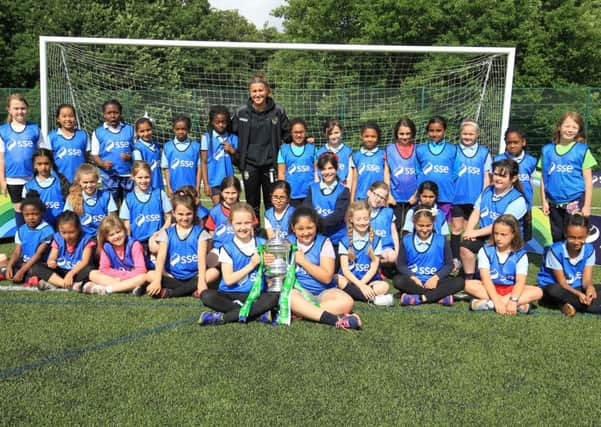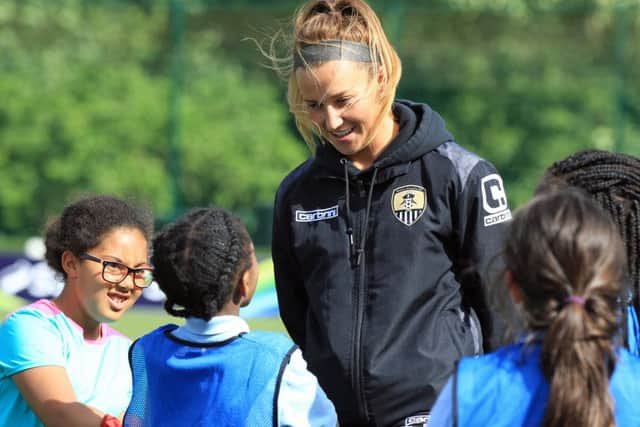Women's football: Amy beats the heartache to pave the way for the next generation


Minutes earlier, they had chatted and bounced around as an increasingly-irate photographer had attempted to organise them for a group shot. When Amy came over for a chat, silence fell.
“What colour is your kit?” eventually came one question. “Black and white,” the Notts County and England Lionesses star answered. “That’s boring!” shot back the youngster.
Advertisement
Hide AdAdvertisement
Hide Ad

Amy persists, fielding questions about the club’s nickname - “Is it The Growlers?” asks one fan. “No, it’s Neil,” says another - before more photographs and, eventually, a game of football.
It’s all part of a new participation programme that Sheffield FC are taking part in, led by Helen Mitchell, aimed at giving young girls between five and 14 the chance to play football, often for the first time.
It’s a cause particularly close to Amy’s heart, after she discovered a love of football as a youngster but was forced to play alongside boys before eventually finding a girls’ team to join.
“I felt I should give my full support to an exciting scheme that I’m sure will benefit a lot of girls,” said Amy, who was born in Stocksbridge.
Advertisement
Hide AdAdvertisement
Hide Ad

“They can see now that they can make a career out of football, that it doesn’t just have to be a hobby, and I hope they look up to players in the Women’s Super League, and myself as a local girl, to see that it is possible and can be done.”
Not that Amy’s path to a full-time WSL star and a five-cap England international has been particularly straightforward.
The 24-year-old is barely a foot taller than some of the girls receiving coaching but there is a fiercely determined competitor below the surface.
“It’s not been a particularly easy path to get to where I am now, but it shows where hard work and determination can get you,” the defender said.
Advertisement
Hide AdAdvertisement
Hide Ad

“I started out at Doncaster Belles, playing quite regularly, and made my WSL debut at 16. I then moved to America to study at Hofstra University in New York, because it was always something I’d wanted to do and, at 18, it felt like the time was right to do it.
“But back home, I’d heard about the Super League and Belles wanted me back so, wanting to get back in the England squad, I thought it would be a good opportunity.
“But a few months later, Belles released me out of the blue and told me I wasn’t good enough to play at that level. Everything I had planned in my life changed, and I was devastated.
“But without that, I don’t think I’d be where I am now. It spurred me on to prove people wrong and I used it to make me a better player.”
Advertisement
Hide AdAdvertisement
Hide Ad

Not before, though, she considered quitting the game altogether.
“It was a stroke of luck, really,” Amy smiles. “The same week I began thinking ‘I can’t do this anymore’, I got a call from Rick Passmore at Lincoln, wanting to bring me to the WSL.
“I hadn’t played at that level since I was 16, so Rick took a real gamble on me and, sitting here now, I guess it paid off.”
Amy’s rollercoaster career then saw her move to Notts County, make her England debut and then play in the first ever Women’s FA Cup Final to be held at Wembley.
Advertisement
Hide AdAdvertisement
Hide AdA crowd of 30,710 watched Chelsea beat County last year, just months after England’s third-placed finish in the Women’s World Cup in Canada captivated a nation.
“The FA Cup at Wembley was an amazing experience,” Amy added. “Although it would have been nice to have won it! But that was the game that really sparked my England career. Mark Sampson, the England Ladies boss, was watching and told me he thought I rose to the challenge well.


“The World Cup in Canada was great for the game. We don’t want to ever compete with the men’s game - we appreciate their standard, and the two are completely different games, if you break it down technically and tactically.
“Our thought process at the minute is about shining in our own right, and not being compared to the men. That’s always going to be there, I guess, but it’s an exciting time to be involved with the women’s game. The appetite is there, it’s only going to get better and I’m confident it’ll only get more successful.”
Advertisement
Hide AdAdvertisement
Hide AdMore than 10,000 watched Sampson’s side rescue a late point against Belgium in their Euro 2017 qualifier at Rotherham’s New York Stadium back in April - a marked shift in attitudes from previous decades, as illustrated by Casey Stoney’s relevation that people questioned if she was genuinely a girl because she was so good at football as a youngster.
Women’s football is now the fastest-growing sport on the planet, and Amy said: “I’m not sure the world now is quite like it was when Casey was growing up, but I’ve had plenty of similar experiences and I’m sure a lot of my teammates have too.
“The England girls are quite open with their experiences, like Fara Williams sleeping rough as a youngster and Karen Carney struggling with depression, and the challenges they’ve overcome can help other girls who look up to them.
“A lot of girls I speak to would also prefer to just be starting out now, with how women’s football has taken off over the last few years, because it’s changed so much from when I was younger.
Advertisement
Hide AdAdvertisement
Hide Ad“I didn’t realise there were junior teams for girls, never mind that I could make a career out of it.
“A lot of girls went overseas to America, and a lot of talent got lost in England.
“But now, girls want to stay here and play full-time in our league - and that’ll do wonders for the game, domestically and internationally.”
SSE’s Participation Programme is creating opportunities for girls to play football across Yorkshire and the rest of the UK. To find out how you can get involved, visit sse.co.uk/girls-united